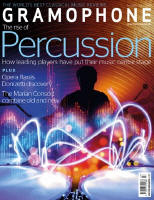Texte paru dans: / Appeared in: |
|
|
Outil de traduction (Très approximatif) |
|
|
Reviewer:
David Vickers Monteverdi’s Venetian church music – whether written for St Mark’s or elsewhere in the city – is preserved selectively in the publications Selva morale e spirituale (1641) and the posthumous Messa a quattro voci et salmi (1650). Two works apiece from each anthology are performed by Odhecaton, joined as required by assorted strings, continuo instruments, and the cornett and trombones of La Pifarescha. An all-male choir sings the polyphonic Messa a quattro voci with warm luminosity, accompanied subtly by discreet continuo; it is an atmospherically immersive alternative to the lucid crispness of The Sixteen’s recent interpretation (Coro, 6/18). Odhectaton use solo voices to beguiling effect in a few passages during a memorably sincere and affecting reading, although the soft-grained high countertenors occasionally stretch tuning a mite uncomfortably. There is a switch of pace and an increase of flamboyance for the more modern concertato Gloria for seven-part voices (including female sopranos), two violins and four trombones (1641); there is plenty of splendour and dynamism in thrilling tutti sections and intimate expressivity in passages for assorted solo voices. The partnership of Alena Dantcheva and continuo players captures the expressive flexibility, emotional engagement and poetic intensity of Monteverdi’s stile rappresentativo in a dolorous account of the Pianto della Madonna (the Latin contrafactum of the lament from Arianna). To conclude, Odhecaton’s male-voice ensemble give an eloquent account of the simpler yet lovely Laetaniae della Beata Vergine (reprinted in 1650). Paolo Da Col’s intelligent programme and sensitive direction balance a variety of styles and dimensions to perfection. |
|




